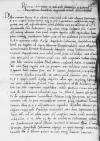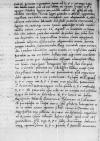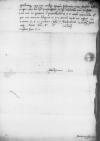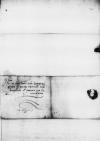Dabit veniam Reverendissima Paternitas Vestra silentio meo, quod Piotrków (Petricovia), city in central Poland, in the 15th-16th century the location of the assemblies of the Diet (Sejm) of the Kingdom of Poland, today Piotrków Trybunalski⌊indePiotrków (Petricovia), city in central Poland, in the 15th-16th century the location of the assemblies of the Diet (Sejm) of the Kingdom of Poland, today Piotrków Trybunalski⌋ iam aliquot septimanis Reverendissimae Paternitatis Vestrae scriptis praeterierim neque Reverendissimae Paternitatis Vestrae exspectationi satisfecerim. Negligentiae non est adscribendum, quod debitum non persoluerim, id est observantiam litteris declararim, neque curis nimiis occupatus fui. Causa est nuntii absentia, tum quod scriptu dignum nihil cognoscebam. Iam quia utriusque facultatem habeo, quae ad me auditione pervenerint, Reverendissimam Paternitatem Vestram ignorare nolui.
Rediit magnificus Lithuaniae marschalcus Mikołaj Krzysztof Radziwiłł Czarny (the Black) (*1515 – †1565)⌊RadzivielMikołaj Krzysztof Radziwiłł Czarny (the Black) (*1515 – †1565)⌋ ex Augsburg (Augusta Vindelicorum), city in Germany, Bavaria⌊AugustaAugsburg (Augusta Vindelicorum), city in Germany, Bavaria⌋ ad Ferdinand I of Habsburg (*1503 – †1564), from 1521 Archduke of Austria, from 1526 King of Bohemia and Hungary, Croatia and Slavonia as Ferdinand I, 1531-1558 King of the Romans, 1558-1564 Holy Roman Emperor; son of Philip I the Handsome and Joanna the Mad of Castile, a younger brother of Charles V of Habsburg⌊regem BohemiaeFerdinand I of Habsburg (*1503 – †1564), from 1521 Archduke of Austria, from 1526 King of Bohemia and Hungary, Croatia and Slavonia as Ferdinand I, 1531-1558 King of the Romans, 1558-1564 Holy Roman Emperor; son of Philip I the Handsome and Joanna the Mad of Castile, a younger brother of Charles V of Habsburg⌋ paraphernaliorum causa ablegatus. Controversiam diremit. Ferdinand I of Habsburg (*1503 – †1564), from 1521 Archduke of Austria, from 1526 King of Bohemia and Hungary, Croatia and Slavonia as Ferdinand I, 1531-1558 King of the Romans, 1558-1564 Holy Roman Emperor; son of Philip I the Handsome and Joanna the Mad of Castile, a younger brother of Charles V of Habsburg⌊FerdinandoFerdinand I of Habsburg (*1503 – †1564), from 1521 Archduke of Austria, from 1526 King of Bohemia and Hungary, Croatia and Slavonia as Ferdinand I, 1531-1558 King of the Romans, 1558-1564 Holy Roman Emperor; son of Philip I the Handsome and Joanna the Mad of Castile, a younger brother of Charles V of Habsburg⌋ debentur 30000 Ioachimicorum. Narrat Mikołaj Krzysztof Radziwiłł Czarny (the Black) (*1515 – †1565)⌊magnificentia suaMikołaj Krzysztof Radziwiłł Czarny (the Black) (*1515 – †1565)⌋ nihil certum sciri vel audiri, aut observari posse, quid in futuram aestatem Charles V of Habsburg (*1500 – †1558), ruler of the Burgundian territories (1506-1555), King of Spain as Charles I (1516-1556), King of Naples and Sicily, King of the Romans (1519-1530), Holy Roman Emperor of the German Nation (elected 1519, crowned 1530, abdicated 1556); son of Philip I the Handsome and Joanna the Mad of Castile⌊caesarea maiestasCharles V of Habsburg (*1500 – †1558), ruler of the Burgundian territories (1506-1555), King of Spain as Charles I (1516-1556), King of Naples and Sicily, King of the Romans (1519-1530), Holy Roman Emperor of the German Nation (elected 1519, crowned 1530, abdicated 1556); son of Philip I the Handsome and Joanna the Mad of Castile⌋ constitutum habeat, contra quos bella movere studeat. Illud saltem exploratum habet, si Charles V of Habsburg (*1500 – †1558), ruler of the Burgundian territories (1506-1555), King of Spain as Charles I (1516-1556), King of Naples and Sicily, King of the Romans (1519-1530), Holy Roman Emperor of the German Nation (elected 1519, crowned 1530, abdicated 1556); son of Philip I the Handsome and Joanna the Mad of Castile⌊caesareae maiestatiCharles V of Habsburg (*1500 – †1558), ruler of the Burgundian territories (1506-1555), King of Spain as Charles I (1516-1556), King of Naples and Sicily, King of the Romans (1519-1530), Holy Roman Emperor of the German Nation (elected 1519, crowned 1530, abdicated 1556); son of Philip I the Handsome and Joanna the Mad of Castile⌋ cum Paul III (Alessandro Farnese) (*1468 – †1549), 1493 elevated to cardinal; 1524 Cardinal-Bishop of Ostia; 1534-1549 Pope⌊papaPaul III (Alessandro Farnese) (*1468 – †1549), 1493 elevated to cardinal; 1524 Cardinal-Bishop of Ostia; 1534-1549 Pope⌋ negotium erit, ut speratur, aut The Helvetii a Celtic (Gallic) tribe ⌊HelvetiosThe Helvetii a Celtic (Gallic) tribe ⌋ petet. Nostrae paper damaged⌈[ae]ae paper damaged⌉ regionis homines salvos fore, nisi hi moram facesserint, praecipue Pomeraniae ducibus timendum. De nostris quid futurum esset, ipsa Reverendissima Paternitas Vestra assequi potest.
Stanisław Łaski (*ca. 1500 – †1550), diplomat and writer; 1534 castellan of Przemęt; 1543 voivode of Sieradz; 1548 starosta of Łęczyca (Urzędnicy 2/2, p. 270)⌊LaskyStanisław Łaski (*ca. 1500 – †1550), diplomat and writer; 1534 castellan of Przemęt; 1543 voivode of Sieradz; 1548 starosta of Łęczyca (Urzędnicy 2/2, p. 270)⌋ Augsburg (Augusta Vindelicorum), city in Germany, Bavaria⌊AugustaeAugsburg (Augusta Vindelicorum), city in Germany, Bavaria⌋ adhuc agit. In quinque septimanis Stanisław Łaski (*ca. 1500 – †1550), diplomat and writer; 1534 castellan of Przemęt; 1543 voivode of Sieradz; 1548 starosta of Łęczyca (Urzędnicy 2/2, p. 270)⌊eumStanisław Łaski (*ca. 1500 – †1550), diplomat and writer; 1534 castellan of Przemęt; 1543 voivode of Sieradz; 1548 starosta of Łęczyca (Urzędnicy 2/2, p. 270)⌋ rediturum ferunt. Cum Mikołaj Krzysztof Radziwiłł Czarny (the Black) (*1515 – †1565)⌊marschalcusMikołaj Krzysztof Radziwiłł Czarny (the Black) (*1515 – †1565)⌋ ab illo discederet, adhuc Charles V of Habsburg (*1500 – †1558), ruler of the Burgundian territories (1506-1555), King of Spain as Charles I (1516-1556), King of Naples and Sicily, King of the Romans (1519-1530), Holy Roman Emperor of the German Nation (elected 1519, crowned 1530, abdicated 1556); son of Philip I the Handsome and Joanna the Mad of Castile⌊caesareae maiestatisCharles V of Habsburg (*1500 – †1558), ruler of the Burgundian territories (1506-1555), King of Spain as Charles I (1516-1556), King of Naples and Sicily, King of the Romans (1519-1530), Holy Roman Emperor of the German Nation (elected 1519, crowned 1530, abdicated 1556); son of Philip I the Handsome and Joanna the Mad of Castile⌋ responsum exspectabant. Doctor Marcin Kromer (Martinus Cromerus) (*1512 – †1589), diplomat, historian, religious and political writer, doctor of both canon and civil law; ennobled in 1552; 1535 scribe of the royal chancellery and secretary of Cracow bishop Jan Chojeński; 1538 canon at the collegiate chapter in Pułtusk, 1540 secretary of Cracow bishop Piotr Gamrat, 1542 parish priest in Biecz; 1544 Cracow canon, 1544-1569 royal secretary (for Prussian affairs), 1551 Ermland canon; 1569 coadjutor of Ermland bishop Stanisław Hozjusz, 1579 - Ermland bishop, 1543 - royal envoy to Wrocław, 1544 - to Rome, 1547 - to Ferdinand I of Habsburg (WYCZAŃSKI 1990, p. 255)⌊Martinus CromerusMarcin Kromer (Martinus Cromerus) (*1512 – †1589), diplomat, historian, religious and political writer, doctor of both canon and civil law; ennobled in 1552; 1535 scribe of the royal chancellery and secretary of Cracow bishop Jan Chojeński; 1538 canon at the collegiate chapter in Pułtusk, 1540 secretary of Cracow bishop Piotr Gamrat, 1542 parish priest in Biecz; 1544 Cracow canon, 1544-1569 royal secretary (for Prussian affairs), 1551 Ermland canon; 1569 coadjutor of Ermland bishop Stanisław Hozjusz, 1579 - Ermland bishop, 1543 - royal envoy to Wrocław, 1544 - to Rome, 1547 - to Ferdinand I of Habsburg (WYCZAŃSKI 1990, p. 255)⌋, qui una ibi fuit, caesareae voluntatis erga serenissimam Sigismund II Augustus Jagiellon (Zygmunt II August) (*1520 – †1572), 1529-1572 Grand Duke of Lithuania (ruled from 1544); 1530-1572 King of Poland (crowned vivente rege (ruled from 1548, after the death of his father); son of Sigismund I Jagiellon and Bona Sforza⌊maiestatem regiamSigismund II Augustus Jagiellon (Zygmunt II August) (*1520 – †1572), 1529-1572 Grand Duke of Lithuania (ruled from 1544); 1530-1572 King of Poland (crowned vivente rege (ruled from 1548, after the death of his father); son of Sigismund I Jagiellon and Bona Sforza⌋ bonam spem facit. Ut dicitur, inscriptionem instructionem palatino Stanisław Łaski (*ca. 1500 – †1550), diplomat and writer; 1534 castellan of Przemęt; 1543 voivode of Sieradz; 1548 starosta of Łęczyca (Urzędnicy 2/2, p. 270)⌊LaskyStanisław Łaski (*ca. 1500 – †1550), diplomat and writer; 1534 castellan of Przemęt; 1543 voivode of Sieradz; 1548 starosta of Łęczyca (Urzędnicy 2/2, p. 270)⌋ praescriptam per transennam vidi, in qua animadverti nostros quoque cessaturos. Instructionem illam Reverendissimae Paternitati Vestrae transmitterem, siquidem commodato obtinere potuissem.
Nostrorum procerum conventus ante duas septimanas solutus est, sed, ut solito more est receptum, vacui unde venerunt, redierunt. Serenissima Sigismund II Augustus Jagiellon (Zygmunt II August) (*1520 – †1572), 1529-1572 Grand Duke of Lithuania (ruled from 1544); 1530-1572 King of Poland (crowned vivente rege (ruled from 1548, after the death of his father); son of Sigismund I Jagiellon and Bona Sforza⌊regia maiestasSigismund II Augustus Jagiellon (Zygmunt II August) (*1520 – †1572), 1529-1572 Grand Duke of Lithuania (ruled from 1544); 1530-1572 King of Poland (crowned vivente rege (ruled from 1548, after the death of his father); son of Sigismund I Jagiellon and Bona Sforza⌋, ex hoc die octiduo in Lithuania⌊LithuaniamLithuania⌋ reditura, Sandomierz (Sandomiria), town in southeastern Poland, Małopolska, on the Vistula river⌊SandomiriaeSandomierz (Sandomiria), town in southeastern Poland, Małopolska, on the Vistula river⌋ apud illustrem Jan Tarnowski (*1488 – †1561), Count of the Holy Roman Empire; one of the most trusted advisors to King Sigismund August Jagiellon at the beginning of his rule; 1522-1527 Castellan of Wojnicz, 1525-1552 Starost of Sandomierz, 1527-1559 Grand Crown Hetman (commander-in-chief), 1527-1535 voivode of Ruthenia, 1528 Starost of Żydaczów, 1535-1536 Voivode of Cracow; 1536-1561 - Castellan (Urzędnicy 10, p. 209)⌊comitem a TarnowJan Tarnowski (*1488 – †1561), Count of the Holy Roman Empire; one of the most trusted advisors to King Sigismund August Jagiellon at the beginning of his rule; 1522-1527 Castellan of Wojnicz, 1525-1552 Starost of Sandomierz, 1527-1559 Grand Crown Hetman (commander-in-chief), 1527-1535 voivode of Ruthenia, 1528 Starost of Żydaczów, 1535-1536 Voivode of Cracow; 1536-1561 - Castellan (Urzędnicy 10, p. 209)⌋ illustris et novi principis Mikołaj Krzysztof Radziwiłł Czarny (the Black) (*1515 – †1565)⌊marschalci LithuaniaeMikołaj Krzysztof Radziwiłł Czarny (the Black) (*1515 – †1565)⌋ nuptiis in ipsis dionysiis intererit, venient illo et Olesne duces, si non uterque, Ioannes tamen.
 AAWO, ABD, 6, f. 106v Quae in Germany (Germania, Niemcy)⌊GermaniaGermany (Germania, Niemcy)⌋ gerantur, fama ad Reverendissimam Paternitatem Vestram pervagata esse non dubito, tamen quae ad nos allata ex insertis scriptis Reverendissima Paternitas Vestra cognoscet.
AAWO, ABD, 6, f. 106v Quae in Germany (Germania, Niemcy)⌊GermaniaGermany (Germania, Niemcy)⌋ gerantur, fama ad Reverendissimam Paternitatem Vestram pervagata esse non dubito, tamen quae ad nos allata ex insertis scriptis Reverendissima Paternitas Vestra cognoscet.
Valachiae legatus iam octiduum nobiscum est. Quid sibi velit, nondum increbuit. Patriae legati cotidie serenissimae maiestatis regiae responsum exspectant. Non dubito, iam accepissent, nisi aliquantulum regia maiestas adversa valetudine laboraret. Sed quid?
Praetereo memoratu dignum in Helvetiis, terra Granis(?), apparuisse in caelo visionem Sanctae Crucis anno 47, 22 Augusti. Ea constituta, ex lateribus eius suborti sunt duo montes, de quibus duo fulvi leones decurrere, cum exporrectam Crucem cursu attigissent, adversum invicem consurrexere, aliquamdiu manu conserta, fatigati tandem septentrionalis plagae orientali caput praemordit, tandem truncatum corpus sensim in consuetum montem protrahit ac ita occidunt. Sublato visu super crucem exoriuntur armatae acies, quae, aliquamdiu conflictati, evanescunt. Visionis huius expressam imaginem ipse vidi.
Haec sunt, quae hic feruntur, plurima ex fidedignis hominibus accepi. Quae alia perfluxu temporis ad nos pervenient, quam maxime dabo operam, Reverendissimam Paternitatem Vestram ne praetereant.
Reliquum est, quod Reverendissimam Paternitatem Vestram orem, ut Reverendissima Paternitas Vestra Jacob Allexwangen Jr ⌊fratri meoJacob Allexwangen Jr ⌋ auxilium, patrocinium et clementiam Reverendissima Paternitas Vestra negare nolit, quando Reverendissimam Paternitatem Vestram implorabit. Reverendissima Paternitas Vestra Jacob Allexwangen Jr ⌊illiJacob Allexwangen Jr ⌋ patronus esse velit ac in accepta munificentia regia eum tueri ac defendere. Reverendissimam Paternitatem Vestraem latere non dubito maginficum Stanisław Kostka (*1487 – †1555), as a leader of the so-called nobles' party active in Royal Prussia since 1536, Kostka stood in opposition to most of the members of the Council of Royal Prussia, who wanted to maintain the autonomy of the province and a "balance of power" in terms of governance. The tension between the Prussian Subtreasurer and the Council had been increasing since the Diet in Graudenz (Grudziądz) in 1533. Kostka, connected with the royal court since his youth, was sent to Graudenz as the King's deputy and, contrary to custom, decided to take part in the proceedings. In response to such a step, the Council members stopped the meeting. Kostka accused them of hostility towards the Poles and intervened on this matter at the court. In the absence of the then Bishop of Ermland (Mauritius Ferber) it was Dantiscus who chaired the Graudenz Diet. The incident badly harmed his future relationships with Kostka; 1531-1555 Treasurer of the Prussian lands and Treasurer of Marienburg (Malbork); 1544-1545 Castellan of Elbing (Elbląg), 1545-1546 Castellan of Kulm (Chełmno); 1546-1549 Vice-Voivode of Kulm; 1546-1551 Voivode of Pomerania; 1551-1555 Voivode of Kulm (PSB 14, p. 356; Urzędnicy 5/2, p. 216; MAŁŁEK 1976, p. 119-123)⌊palatinum PomeraniaeStanisław Kostka (*1487 – †1555), as a leader of the so-called nobles' party active in Royal Prussia since 1536, Kostka stood in opposition to most of the members of the Council of Royal Prussia, who wanted to maintain the autonomy of the province and a "balance of power" in terms of governance. The tension between the Prussian Subtreasurer and the Council had been increasing since the Diet in Graudenz (Grudziądz) in 1533. Kostka, connected with the royal court since his youth, was sent to Graudenz as the King's deputy and, contrary to custom, decided to take part in the proceedings. In response to such a step, the Council members stopped the meeting. Kostka accused them of hostility towards the Poles and intervened on this matter at the court. In the absence of the then Bishop of Ermland (Mauritius Ferber) it was Dantiscus who chaired the Graudenz Diet. The incident badly harmed his future relationships with Kostka; 1531-1555 Treasurer of the Prussian lands and Treasurer of Marienburg (Malbork); 1544-1545 Castellan of Elbing (Elbląg), 1545-1546 Castellan of Kulm (Chełmno); 1546-1549 Vice-Voivode of Kulm; 1546-1551 Voivode of Pomerania; 1551-1555 Voivode of Kulm (PSB 14, p. 356; Urzędnicy 5/2, p. 216; MAŁŁEK 1976, p. 119-123)⌋ plebaniam in Grosse Lichtenau (Lichnowy), village in Ermland⌊LithtenauGrosse Lichtenau (Lichnowy), village in Ermland⌋ illi praeripuisse ac concesso iure Sigismund II Augustus Jagiellon (Zygmunt II August) (*1520 – †1572), 1529-1572 Grand Duke of Lithuania (ruled from 1544); 1530-1572 King of Poland (crowned vivente rege (ruled from 1548, after the death of his father); son of Sigismund I Jagiellon and Bona Sforza⌊regiae maiestatisSigismund II Augustus Jagiellon (Zygmunt II August) (*1520 – †1572), 1529-1572 Grand Duke of Lithuania (ruled from 1544); 1530-1572 King of Poland (crowned vivente rege (ruled from 1548, after the death of his father); son of Sigismund I Jagiellon and Bona Sforza⌋ prohibere. Interposuit ea in re etiam suam operam illustris Jan Tarnowski (*1488 – †1561), Count of the Holy Roman Empire; one of the most trusted advisors to King Sigismund August Jagiellon at the beginning of his rule; 1522-1527 Castellan of Wojnicz, 1525-1552 Starost of Sandomierz, 1527-1559 Grand Crown Hetman (commander-in-chief), 1527-1535 voivode of Ruthenia, 1528 Starost of Żydaczów, 1535-1536 Voivode of Cracow; 1536-1561 - Castellan (Urzędnicy 10, p. 209)⌊comes a TarnowJan Tarnowski (*1488 – †1561), Count of the Holy Roman Empire; one of the most trusted advisors to King Sigismund August Jagiellon at the beginning of his rule; 1522-1527 Castellan of Wojnicz, 1525-1552 Starost of Sandomierz, 1527-1559 Grand Crown Hetman (commander-in-chief), 1527-1535 voivode of Ruthenia, 1528 Starost of Żydaczów, 1535-1536 Voivode of Cracow; 1536-1561 - Castellan (Urzędnicy 10, p. 209)⌋. Jan Tarnowski (*1488 – †1561), Count of the Holy Roman Empire; one of the most trusted advisors to King Sigismund August Jagiellon at the beginning of his rule; 1522-1527 Castellan of Wojnicz, 1525-1552 Starost of Sandomierz, 1527-1559 Grand Crown Hetman (commander-in-chief), 1527-1535 voivode of Ruthenia, 1528 Starost of Żydaczów, 1535-1536 Voivode of Cracow; 1536-1561 - Castellan (Urzędnicy 10, p. 209)⌊CuiJan Tarnowski (*1488 – †1561), Count of the Holy Roman Empire; one of the most trusted advisors to King Sigismund August Jagiellon at the beginning of his rule; 1522-1527 Castellan of Wojnicz, 1525-1552 Starost of Sandomierz, 1527-1559 Grand Crown Hetman (commander-in-chief), 1527-1535 voivode of Ruthenia, 1528 Starost of Żydaczów, 1535-1536 Voivode of Cracow; 1536-1561 - Castellan (Urzędnicy 10, p. 209)⌋ Stanisław Kostka (*1487 – †1555), as a leader of the so-called nobles' party active in Royal Prussia since 1536, Kostka stood in opposition to most of the members of the Council of Royal Prussia, who wanted to maintain the autonomy of the province and a "balance of power" in terms of governance. The tension between the Prussian Subtreasurer and the Council had been increasing since the Diet in Graudenz (Grudziądz) in 1533. Kostka, connected with the royal court since his youth, was sent to Graudenz as the King's deputy and, contrary to custom, decided to take part in the proceedings. In response to such a step, the Council members stopped the meeting. Kostka accused them of hostility towards the Poles and intervened on this matter at the court. In the absence of the then Bishop of Ermland (Mauritius Ferber) it was Dantiscus who chaired the Graudenz Diet. The incident badly harmed his future relationships with Kostka; 1531-1555 Treasurer of the Prussian lands and Treasurer of Marienburg (Malbork); 1544-1545 Castellan of Elbing (Elbląg), 1545-1546 Castellan of Kulm (Chełmno); 1546-1549 Vice-Voivode of Kulm; 1546-1551 Voivode of Pomerania; 1551-1555 Voivode of Kulm (PSB 14, p. 356; Urzędnicy 5/2, p. 216; MAŁŁEK 1976, p. 119-123)⌊magnificentia suaStanisław Kostka (*1487 – †1555), as a leader of the so-called nobles' party active in Royal Prussia since 1536, Kostka stood in opposition to most of the members of the Council of Royal Prussia, who wanted to maintain the autonomy of the province and a "balance of power" in terms of governance. The tension between the Prussian Subtreasurer and the Council had been increasing since the Diet in Graudenz (Grudziądz) in 1533. Kostka, connected with the royal court since his youth, was sent to Graudenz as the King's deputy and, contrary to custom, decided to take part in the proceedings. In response to such a step, the Council members stopped the meeting. Kostka accused them of hostility towards the Poles and intervened on this matter at the court. In the absence of the then Bishop of Ermland (Mauritius Ferber) it was Dantiscus who chaired the Graudenz Diet. The incident badly harmed his future relationships with Kostka; 1531-1555 Treasurer of the Prussian lands and Treasurer of Marienburg (Malbork); 1544-1545 Castellan of Elbing (Elbląg), 1545-1546 Castellan of Kulm (Chełmno); 1546-1549 Vice-Voivode of Kulm; 1546-1551 Voivode of Pomerania; 1551-1555 Voivode of Kulm (PSB 14, p. 356; Urzędnicy 5/2, p. 216; MAŁŁEK 1976, p. 119-123)⌋ pollicita se Jacob Allexwangen Jr ⌊fratriJacob Allexwangen Jr ⌋ non defuturum, negotium ad reverendissimum Tiedemann Giese (Tidemannus Gisius) (*1480 – †1550), in 1519 ennobled by King Sigismund I; 1504-1538 Canon of Ermland (Warmia); 1516-1527, 1533-1537 Judicial Vicar and Vicar General of Ermland; 1523-1538 Custos of Ermland; 1537-1549 Bishop of Kulm (Chełmno); 1549-1550 Bishop of Ermland (BORAWSKA 1984, passim)⌊episcopum CulmensemTiedemann Giese (Tidemannus Gisius) (*1480 – †1550), in 1519 ennobled by King Sigismund I; 1504-1538 Canon of Ermland (Warmia); 1516-1527, 1533-1537 Judicial Vicar and Vicar General of Ermland; 1523-1538 Custos of Ermland; 1537-1549 Bishop of Kulm (Chełmno); 1549-1550 Bishop of Ermland (BORAWSKA 1984, passim)⌋ deferri iussit.
Quod meae est gratitudinis Jacob Allexwangen Jr ⌊fratrisJacob Allexwangen Jr ⌋ erga Reverendissimam Paternitatem Vestram fidei, observantiae, dabimus uterque operam, ut superinscribed⌈utut superinscribed⌉ hanc Reverendissimae Paternitatis Vestrae pietatem et paternum amorem,  AAWO, ABD, 6, f. 107r affectumque erga nos studiis assequi possimus. Nec Jacob Allexwangen Jr ⌊fraterJacob Allexwangen Jr ⌋ Reverendissimam Paternitatem Vestram scriptis suis hoc tempore praeteriisset, si ipsi abeundum non fuisset.
AAWO, ABD, 6, f. 107r affectumque erga nos studiis assequi possimus. Nec Jacob Allexwangen Jr ⌊fraterJacob Allexwangen Jr ⌋ Reverendissimam Paternitatem Vestram scriptis suis hoc tempore praeteriisset, si ipsi abeundum non fuisset.
His me in gratiam et protectionem Reverendissimae Paternitatis Vestrae iterum commendo et quo me amore diligere Reverendissima Paternitas Vestra semel coepit, ne cesset, ex animo Reverendissimam Paternitatem Vestram precor.
 AAWO, ABD, 6, f. 106v Quae in
AAWO, ABD, 6, f. 106v Quae in  AAWO, ABD, 6, f. 107r affectumque erga nos studiis assequi possimus. Nec
AAWO, ABD, 6, f. 107r affectumque erga nos studiis assequi possimus. Nec 


